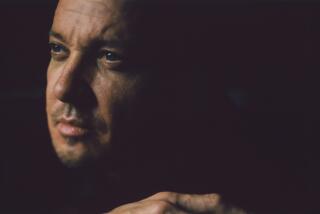A new perspective, on the job
NEW YORK -- While it’s hard to think of positives to come out of a severe brain injury, here’s one: It helped ABC News’ Bob Woodruff score a scoop.
South Dakota Sen. Tim Johnson turned to Woodruff for a “Nightline” report on his recovery and return to public life this week after a brain hemorrhage. The Democrat probably figured no other reporter would better understand what he went through.
Woodruff has quietly returned to work full time at ABC following the January 2006 bombing in Iraq that nearly killed him; he’s already traveled to Cuba, Syria and throughout the United States to report stories.
His report on Johnson was overshadowed last week by reports of Sen. Larry Craig’s arrest in a men’s restroom sting, but was still a significant “get.” Johnson’s health was a mystery and of great interest because Democratic control of the Senate was at stake if he couldn’t continue.
ABC said Woodruff and Johnson reached out to each other at about the same time late last winter. Johnson’s wife had read the book that Woodruff and wife Lee had written about the bombing and its aftermath. (Johnson’s press secretary didn’t return repeated messages).
“When you’re talking publicly about what’s going on, you wonder how much you have to explain about what you’re going through,” Woodruff told the Associated Press. “I think they knew they didn’t have to do that with me.”
Johnson became disoriented Dec. 13 while on a conference call with reporters -- “Nightline” played the tape of him searching for words -- and was taken immediately to the hospital. He had emergency surgery for arteriovenous malformation, a condition that causes arteries and veins in the brain to become tangled and sometimes burst.
Woodruff visited Johnson in April and June to check on the senator’s progress in learning to walk and talk again. He was able to point out, to Johnson’s knowing smile, how difficulty and slowness in speaking doesn’t necessarily mean the brain is processing thoughts slowly.
In the “Nightline” report, Woodruff noted how two years was once considered the typical recovery time from severe brain injuries. “Everyone says that it’s an absolute lie,” he said.
At some point with most patients, recovery slows to the point where there is little further improvement, Woodruff explained later. Insurers fixated on two years, but when that point is reached can vary dramatically, he said.
Woodruff’s own recovery is continuing.
“There certainly continues to this day frustrations that I go through,” he said. “I’ve got some words that don’t pop up immediately for me anymore. There are certainly a lot of names that I can’t remember. I think that’s going to continue to improve over time. My ability to come up with words and names is better just about every single day, and who knows how long that’s going to be?”
Doctors have told him from the start that he’ll never be 100% of what he was before.
Woodruff’s own reemergence came in February, when ABC aired a documentary about his experience. It was coupled with Woodruff’s first stab at reporting again, which was influential in bringing to light problems associated with the large numbers of soldiers returning from Iraq with head injuries.
Even at that point, no one was really sure what the future held for Woodruff at ABC News.
But he’s steadily ramped up his reporting to where he’s full time again, said Paul Slavin, ABC News senior vice president. Woodruff has continued to follow the plight of brain-injured soldiers and recently met with a group of blind Iraq war veterans. He also interviewed students injured in the Virginia Tech shootings.
Away from the broken body beat, he’s reported on Iraqi emigres in Syria and the Castro government in Cuba.
“He does a whole range of things,” Slavin said. “I think Bob’s got a bright future. There’s nothing that I can’t see him being able to do in the next few years. His level of determination is almost superhuman.”
The main concession to his injury seems to be a reluctance to do live reports, where there is a chance his occasional reaches for a word or thought would be visible.
“Did I really think I’d be able to return as much as I have now? I don’t know,” Woodruff said. “I’ve dreamt about it, but did I really believe it? I don’t know. Now I do believe it, and I’m able to report now, travel now, to work with people that I’ve worked with all of these years, and I’m ecstatic about that.”
Last week’s trip to South Dakota for Johnson’s first public appearance marked two straight weeks on the road for Woodruff.
The family that spent weeks wondering if he would live is again getting used to having him away for work. “Why are you making me feel guilty?” Woodruff said with a groan.
Does Woodruff aspire to become ABC’s chief anchor again, a distinction he shared with Elizabeth Vargas for less than a month before he was hurt?
“I learned about how things can change in an instant,” he said, “so it’s hard to think of exactly what you want to do.”
More to Read
Get the L.A. Times Politics newsletter
Deeply reported insights into legislation, politics and policy from Sacramento, Washington and beyond. In your inbox three times per week.
You may occasionally receive promotional content from the Los Angeles Times.










